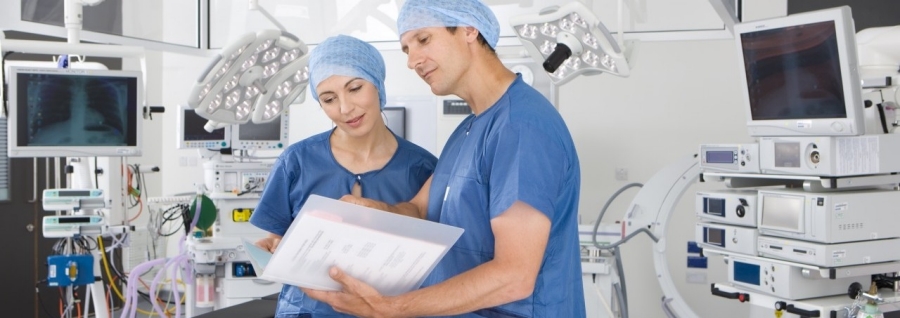Advice from a Colon Cancer Survivor
Effective screening programs are important for catching colon cancer early, when treatment is most likely to save lives — but only if you use them.
Bruce Raaka had recently retired as an endocrine and cancer researcher at the National Institutes of Health when he was diagnosed with colorectal (colon) cancer in 2012 at age 62. His symptoms, including bleeding, prompted a colonoscopy that he concedes should have been had years before.
The cancer had spread to his liver, requiring surgery to remove all but the left lobe. The liver, however, is unique among the body’s organs in its ability to regrow. Raaka survived his cancer and today serves this warning: Get a colonoscopy if you are age 50 or over, at regular intervals as recommended by your doctor based on your medical history. Don’t put them off.
YOU MIGHT ALSO LIKE: Signs and Symptoms of Colon Cancer
Every year, about 140,000 Americans are diagnosed with colon cancer more than 52,000 people die from it, according to the Centers for Disease Control and Prevention (CDC).
At age 48, Raaka had a colonoscopy that found nothing wrong. He switched doctors about 10 years later, however, and had not had a colonoscopy since.
“I don't know what would have happened if I had gotten a colonoscopy then,” Raaka says with regret. “I was so disappointed when I was diagnosed (two years later). I am sure that it either would not have progressed to my liver or would not have gotten as far along. Maybe I would have had fewer complications with the cancer.”
His other regret: the doctor had asked Raaka for a fecal occult blood test, which screens for early colon cancer by identifying blood in the stool, in turn catching benign intestinal polyps before they become cancerous or very early cancer.
Raaka didn’t do it. It’s a distasteful process that involves smearing small bits of fecal matter onto a card and mailing it to a lab, but the potential risk makes it seem a lot less repugnant in retrospect, he concedes.
Regardless of your diagnosis and treatment plan, be careful when you look for information about colon cancer, Raaka also warns. A lot of readily available information is scary, and does not take newer, more effective treatments into account.
“You’re better off staying as positive as you can and, if you are comfortable with your oncologist, listen to him, and do what he tells you to do. Your physician will also be conservative with you. They all have to be,” he adds. But at the same time, today’s doctors are practicing at the leading edge of current medical science.
Effective screening programs are important for catching colon cancer early, when treatment and cure is most likely.
In recent years, research has shown a dramatic increase in colon cancer in younger people compared to the past. The American Cancer Society now recommends people at average risk for colon cancer begin screenings at age 45, instead of 50, as previously recommended.
Your medical history and a familial history of colorectal cancer will determine how close those intervals are. It could be every year, it could be every five years, it could be every 10. People with a family history of colon cancer may need screening earlier. And doctors are urging younger people with symptoms to have a colonoscopy as soon as possible.
There are proactive ways to lower your risk of colon and rectal cancer, including eating certain foods while avoiding others. For example, according to the American Cancer Society (ACS), a diet that's high in red meats (such as beef, pork, lamb, or liver) and processed meats (like hot dogs and some luncheon meats) is a known risk factor for colorectal cancer. In addition, when meat is cooked at very high temperatures (frying, broiling, or grilling), chemicals are created that may further raise your cancer risk.
Bottom line: Following a healthy eating pattern rich in fruits, vegetables, and fiber-rich whole grains, and limiting or avoiding red and processed meats and sugary drinks, likely lowers your risk of colon cancer, the ACS says.
“Exercise, not smoking, drinking lots of water, all those sorts of general things” that are healthy overall should help prevent colon cancer, too, notes Eric Liu, MD, a surgical oncologist and chief medical advisor for The Healing Net Foundation.
The most important preventive measure you can take, by far, Liu emphasizes, is a colonoscopy. Colon cancer generally develops slowly, and doctors can remove potentially precancerous but benign polyps found on the wall of the colon during the procedure. Even if you have cancer, surgery can be far less extensive if the disease is caught early through colonoscopy, Liu says. He also urges a second opinion in all cases.
" Support is extremely important. No one should go through cancer alone. There are a lot of resources and many support groups. I also want to convey to patients that there is a lot of hope. There is a lot of research devoted to (colon cancer) that is improving treatment, diagnostic techniques, and a personalized approach to it.”
You can find a support group near you here.
Updated:
February 24, 2022
Reviewed By:
Christopher Nystuen, MD, MBA and Janet O'Dell, RN
